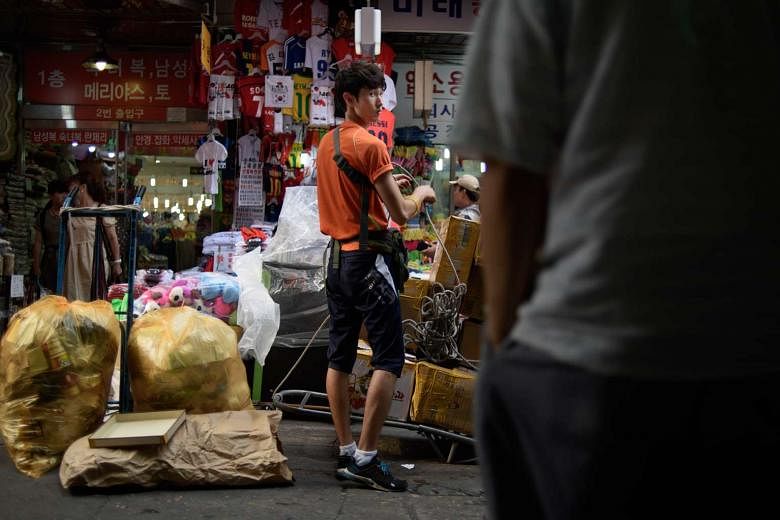SEOUL (BLOOMBERG) - South Korea - the world's biggest exporter to China - is getting squeezed as weaker demand from its larger neighbor helped send its shipments tumbling the most since 2009.
The nation's exports plunged 14.7 per cent in August from a year earlier, an eighth straight monthly decline, as shipments to all its major markets fell, according to the trade ministry. Economists had forecast a 5.9 per cent drop.
"August exports had been expected to be bad, but the data turned out to be even worse," said Lee Sang Jae, a Seoul-based economist for Eugene Investment & Securities Co. "With China taking the largest share of Korea's exports, it will be difficult to expect a recovery unless China's economy improves."
The slump is raising risks to growth in a nation that generates about half of its gross domestic product by shipping products overseas. As a supplier of mobile phone components, car parts and other intermediate goods to Chinese manufacturers, Korea is under pressure from weakening demand in its biggest export market. China's official factory gauge fell in August to the lowest reading in three years.
Korea is one of the most exposed to depreciation in the yuan, and is facing increasing competition from Chinese companies that are moving up the value-added chain, according to the Institute of International Finance last week.
Shipments to China fell 8.8 per cent in August from a year earlier, while those to Japan and the European Union fell 24.4 per cent and 20.8 per cent, respectively, according to the trade ministry. Sales to China deteriorated due to the explosion in Tianjin area and as import demand from China waned, the statement showed.
China is narrowing South Korea's lead in technology, according to the Korea Institute of S&T Evaluation and Planning. The level of technology in 120 key areas across the Korean economy was 1.9 years ahead of China in 2012, but shrank to 1.4 years in 2014, it said. Chinese handset producers Xiaomi Corp. and Huawei Technologies Co. are increasingly competing with Korea's Samsung Electronics Co., whose profits fell for a fifth quarter in the period ending June.
The Bank of Korea forecasts that Asia's fourth-biggest economy will expand 2.8 per cent this year, while the finance ministry projects a 3.1 per cent expansion. Economists surveyed by Bloomberg Aug. 13 to 19 see the economy managing just 2.6 per cent growth.
Officials have also sought to spur domestic demand, with four interest-rate cuts since August last year to an unprecedented low of 1.5 per cent, and a record-sized budget for this year. Even so, the economy grew just 0.3 per cent in the April-June quarter.
The government put together packages in April and July that offered Korean firms marketing aid and trade insurance to help them better compete overseas.
About 25 per cent of Korea's overseas shipments went to China in the first half of this year, according to trade ministry data. Of the sales to China, 68 per cent were intermediary goods, and only 4 per cent were consumer products, according to the Korea Trade-Investment Promotion Agency. The rest was mainly capital goods.
Should China's growth slow to between 5 percent to 5.9 per cent from its 7.4 perc ent pace last year, South Korea's exports would fall a further 2.2 percentage points and its economic growth would be reduced by 0.6 point, according to an Aug. 28 report by Hyundai Research Institute.
"Countries like Korea that send intermediary goods to China and benefited from its growth during the good days are now seeing bigger damage," said Lee Bong Geol, an economist for Institute for International Trade in Seoul. "Korean companies need to adapt to the shift in China's industrial structure to a more consumer goods, services industry-focused economy." -

